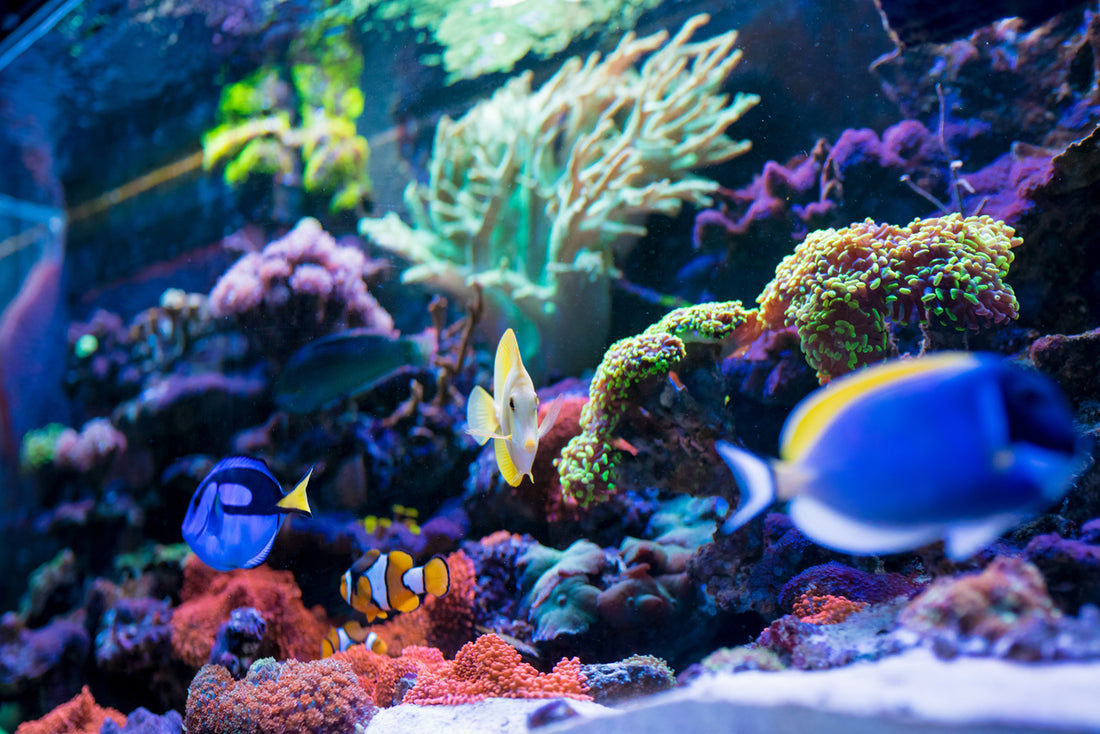
Underwater Radiance: Optimizing Your Reef Tank with UV Light Technology
- UV light technology uses UV-C light to eliminate harmful microorganisms in aquariums, improving water quality and clarity.
- The impact of UV light on coral health in reef tanks is mixed, with potential risks if not properly managed and benefits in reducing harmful pathogens.
- UV sterilizers can be safely used in reef tanks with proper placement and controlled settings to minimize harm to coral.
- Alternatives to UV sterilizers for reef tanks include mechanical, biological, and chemical filtration methods.
Maintaining a healthy reef tank requires a delicate balance of various factors, including water quality, lighting, and the overall health of your coral and marine life. One technology that often sparks debate among aquarium enthusiasts is the use of reef tank UV light sterilizers. Let’s explore how UV light technology works in aquariums, its impact on coral health, and when it is safe to use in reef tanks.
Understanding UV Light Technology in Aquariums
UV light technology is widely used in aquariums to control the growth of harmful microorganisms and pathogens. A UV sterilizer uses ultraviolet light to destroy the DNA of bacteria, viruses, and algae, effectively eliminating these organisms from the water. By passing the aquarium water through a chamber containing a UV light, these sterilizers help maintain clearer, healthier water by reducing the load of potentially harmful pathogens.
The benefits of UV sterilization are numerous: improved water clarity, reduced algae blooms, and a lower risk of disease outbreaks among your fish and invertebrates. These benefits make UV sterilizers a valuable tool for many aquarium owners looking to maintain a pristine aquatic environment.
UV Light and Coral Health: What’s the Truth?
There is mixed information regarding the impact of UV light on coral health in reef tanks. Some hobbyists worry that UV sterilizers may harm their delicate coral by disrupting growth and damaging tissues. However, the truth is more nuanced.
Potential Risks: If not properly managed, UV light can potentially disrupt coral growth and harm sensitive tissues. This risk is higher if the UV sterilizer is placed too close to the coral or if it is too powerful for the tank’s size.
Benefits: On the other hand, UV sterilizers can help reduce harmful pathogens and algae that might otherwise stress coral and compromise the overall health of the reef ecosystem. By eliminating these threats, UV light can indirectly benefit coral health by creating a more stable and clean environment.
The key is to use UV sterilizers cautiously, considering the specific needs of your coral and reef inhabitants. Proper placement and controlled settings are crucial to ensure that the benefits of UV sterilization are realized without negatively impacting your coral.
When UV Sterilizers Are Safe for Reef Tanks
Under certain conditions, UV sterilizers can be safely used in reef tanks with coral. Here are some guidelines to ensure safe use:
Proper Placement: UV sterilizers should be positioned to avoid direct exposure to corals. This means placing the unit in a location where the water passes through the UV light but does not shine on the coral.
Controlled Settings: Using UV sterilizers with adjustable settings allows you to tailor the intensity of the UV light to your tank’s needs. Lowering the intensity can help minimize potential harm to coral while still providing the benefits of UV sterilization.
By following these guidelines, you can enjoy the advantages of UV sterilization without compromising the health of your coral.
Alternatives to UV Sterilizers for Reef Tanks
If you decide that a UV sterilizer is not the best option for your reef tank, there are alternative methods to maintain water quality:
Mechanical Filtration: High-quality mechanical filters can effectively remove particulate matter from the water, reducing the overall load on the tank’s ecosystem.
Biological Filtration: Utilizing live rock and other biological media helps maintain a balanced and healthy environment through natural processes.
Chemical Filtration: Activated carbon and other chemical filters can address specific water quality issues, such as removing organic pollutants and improving water clarity.
These methods can provide effective filtration and water treatment without the potential risks associated with UV light for coral.
A Cleaner Environment for Your Tank
If your aquarium has coral, it’s possible to use UV sterilizers, but there is the risk of coral damage based on the factors of your tank. For aquariums without coral, UV sterilizers are an excellent option for maintaining water quality and clarity. Aqua Ultraviolet’s Advantage fish tank series offers reliable UV sterilization solutions that are perfect for freshwater and marine aquariums. These sterilizers are designed to effectively reduce harmful microorganisms and algae, ensuring a healthy environment for your fish and other aquatic life.
Explore Aqua Ultraviolet’s Advantage fish tank series to find the perfect UV sterilizer for your aquarium needs. Enhance your tank’s water quality with the power of UV light and enjoy a clearer, healthier aquatic environment.
Choosing the right reef tank UV light sterilizer involves understanding its benefits and potential risks. By making informed decisions and following best practices, you can optimize your reef tank’s health and radiance. Aqua Ultraviolet provides top-tier solutions for aquariums, ensuring you have the tools needed for a thriving aquatic ecosystem.
